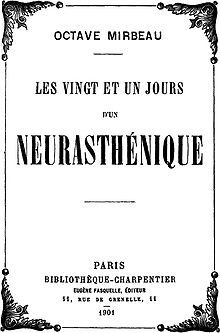
Les Vingt et un Jours d'un neurasthénique
Encyclopedia

Expressionism
Expressionism was a modernist movement, initially in poetry and painting, originating in Germany at the beginning of the 20th century. Its typical trait is to present the world solely from a subjective perspective, distorting it radically for emotional effect in order to evoke moods or ideas...
novel by the French writer Octave Mirbeau
Octave Mirbeau
Octave Mirbeau was a French journalist, art critic, travel writer, pamphleteer, novelist, and playwright, who achieved celebrity in Europe and great success among the public, while still appealing to the literary and artistic avant-garde...
, published by Charpentier-Fasquelle in August of 1901
1901 in literature
The year 1901 in literature involved some significant new books.-Events:* First Nobel Prize for Literature awarded, to French poet Sully Prudhomme; many are outraged when Leo Tolstoy does not win...
.
Commentary
It's a collageCollage
A collage is a work of formal art, primarily in the visual arts, made from an assemblage of different forms, thus creating a new whole....
of fifty cruel tales already published in the press over the previous fifteen years. So Mirbeau unsettles traditional novelistic conventions, transgressing the code of fictional credibility and maintaining indeterminacy of its genre affiliation.
A fictionalized rendering of the author’s sojourn a few years before at the Pyrenean spa of Luchon, the novel mirrors a vagrant plot in its episodic narrative. Mirbeau’s narrator, Georges Vasseur, moves from observation to recollection, traveling from sanitarium to insane asylum and finally to the desolate mountain retreat of a misanthropic friend, who propounds his philosophy of nihilism and decries the futility of art.
In his peripatetic narrative, Mirbeau casts a glaring light on the defective human animal, who tries to compensate for his susceptibility to the most humiliating bodily afflictions by asserting scientific mastery of the dangerous world he tries to navigate. Mirbeau combines attacks on colonialism, psychiatry, the politics of intolerance with a rehabitation of man, deemed precious for his very unknowability. While doctors, bureaucrats, and billionaires try to overcome their sense of ontological uncertainty, using X-ray technology, money, or ideological fanaticism, Mirbeau suggests life’s value consists in its unprecitability. Opposing the pretentiousness of science, the deathliness of knowledge systems, Mirbeau invokes the vitality of an art of exploration and creative conjecture.
The French society of the Third Republic
French Third Republic
The French Third Republic was the republican government of France from 1870, when the Second French Empire collapsed due to the French defeat in the Franco-Prussian War, to 1940, when France was overrun by Nazi Germany during World War II, resulting in the German and Italian occupations of France...
is presented as a completely mad world in the novel, where everything is out of justice, order and reason.

